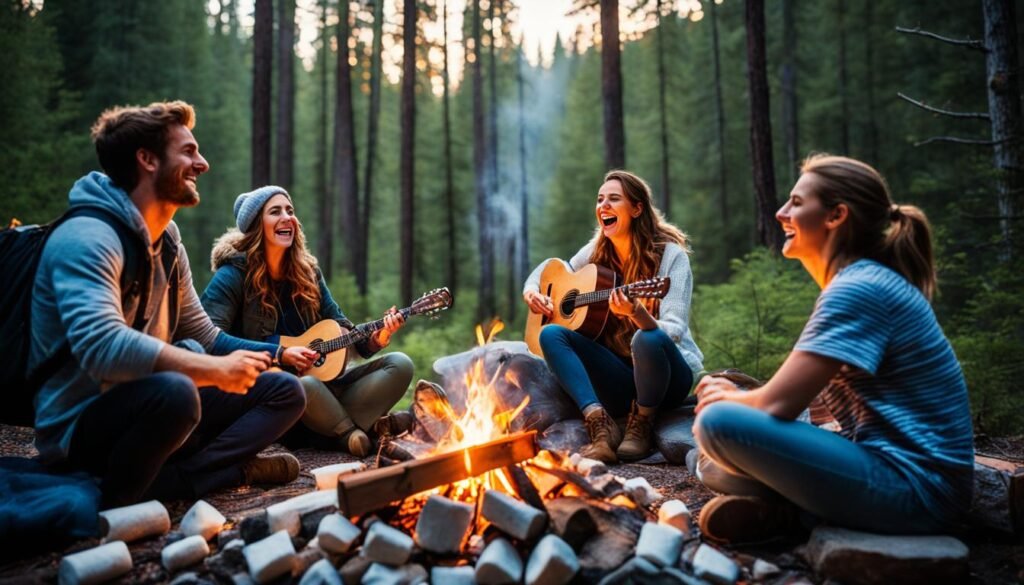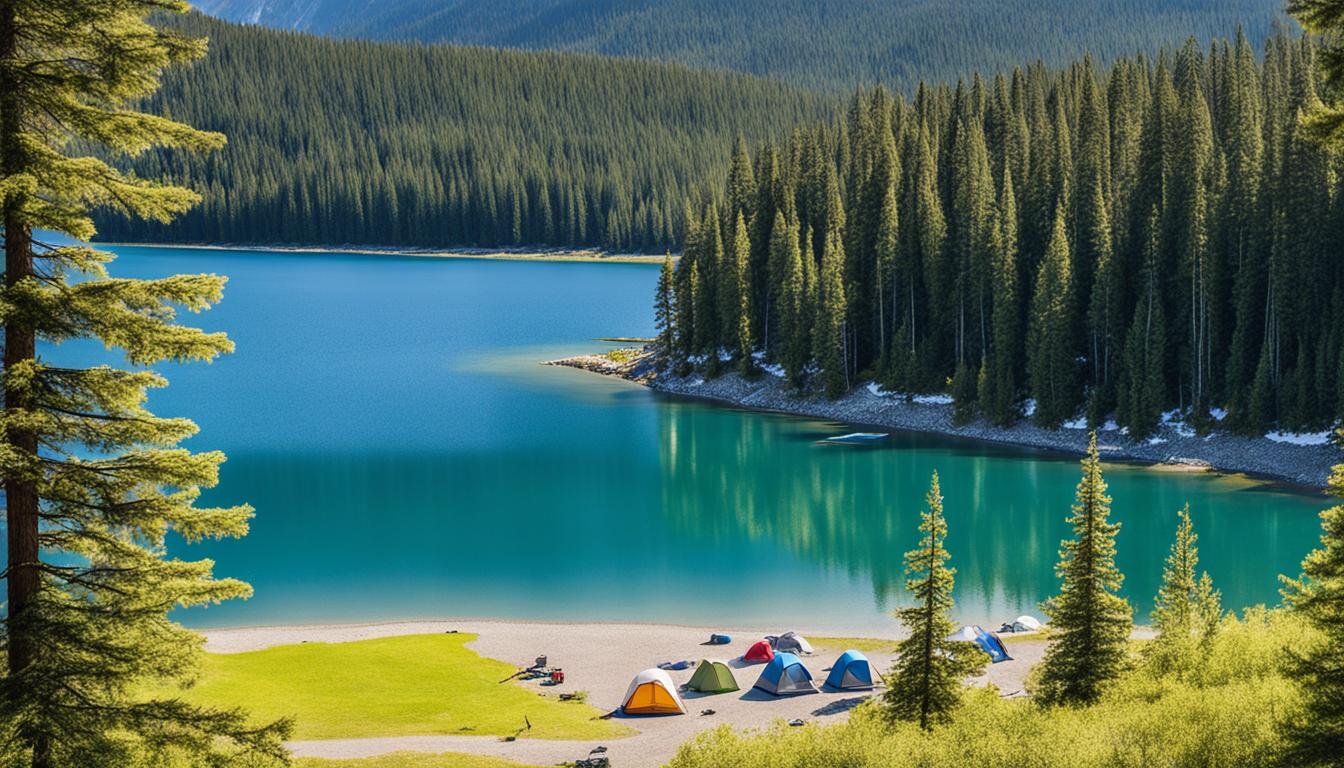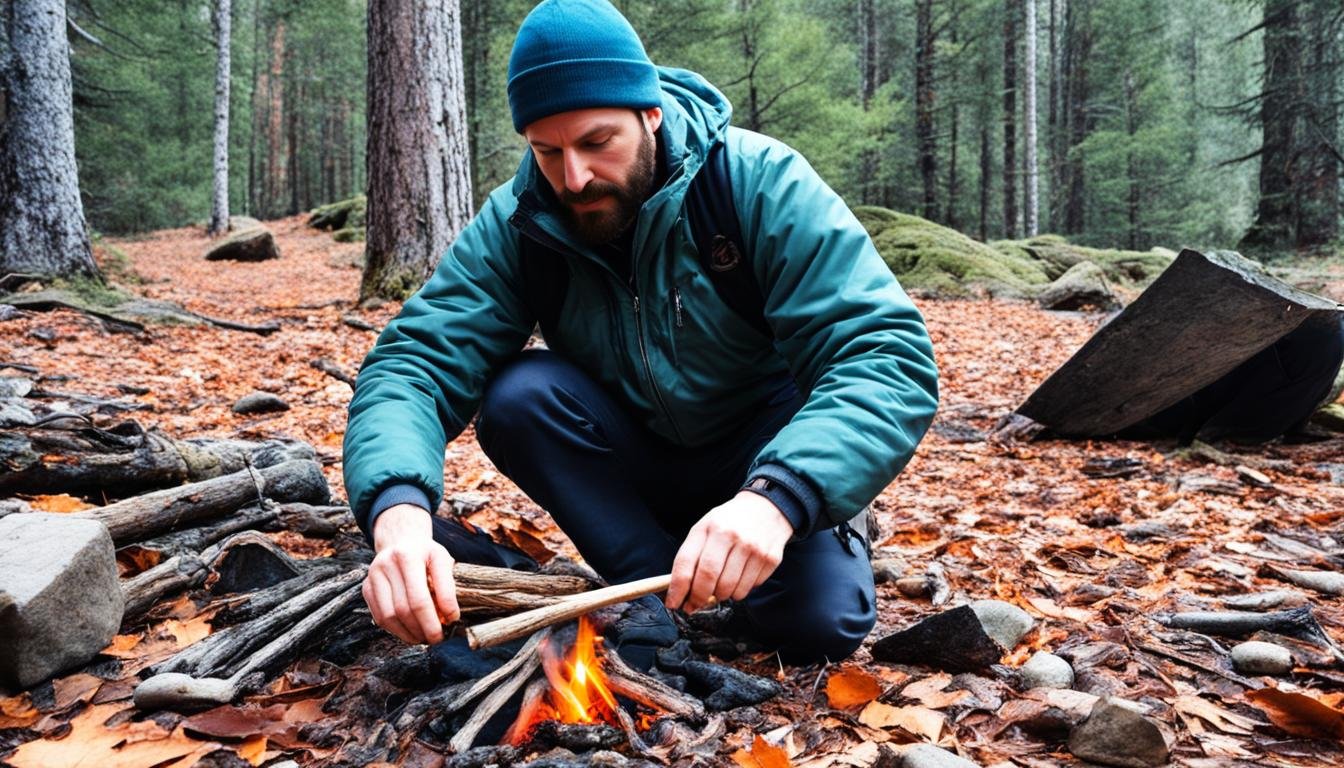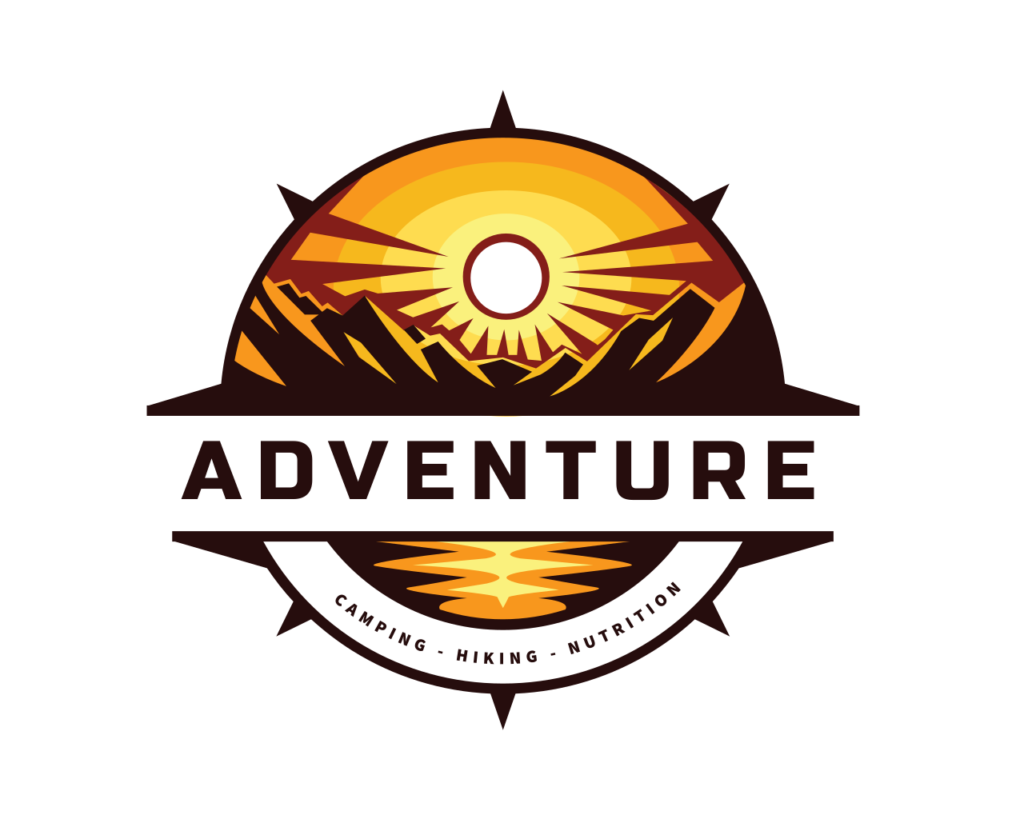Camping Equipment and Gear Guide
Explore the ultimate guide to camping equipment and gear for a safe, comfortable, and enjoyable outdoor adventure.
Essential Camping Equipment
Did you know most Americans spend about 90% of their time indoors? Our lives are filled with technology, making us feel disconnected from nature. But, camping can help us reconnect with the world around us and refresh our spirits. Make your camping trips hassle-free with these must-have items.

Camping is more
Than just setting up a tent and sleeping outside. It's a chance to leave behind the hustle of city life and dive into the outdoors. It's perfect for both seasoned adventurers and those new to camping, offering many benefits.
When camping, we get to deeply connect with nature. We’re surrounded by tall trees, stunning views, and wildlife sounds. This experience makes us feel amazed and grateful. It lets us slow down, breathe deeply, and enjoy nature’s beauty.
Are you ready to hear nature’s call? Let’s dive into why camping is an unmatched experience. It helps us reconnect with nature, find peace, and enjoy health benefits. Camping is filled with moments we’ll always remember.
Key Takeaways:
- Spending time outdoors while camping allows us to reconnect with nature.
- Camping offers spiritual and emotional benefits, helping us find inner peace.
- The fresh air and physical activities associated with camping provide numerous health benefits.
- Camping is a great opportunity to escape the stresses of city life and appreciate the beauty of the wilderness.
- Camping creates lasting memories and offers a sense of adventure that cannot be replicated elsewhere.
The Benefits of Embracing the Great Outdoors
Are you ready to hear nature’s call? Let’s dive into why camping is an unmatched experience. It helps us reconnect with nature, find peace, and enjoy health benefits. Camping is filled with moments we’ll always remember.

Reconnecting with Nature and Finding Inner Peace
Health Benefits of Camping: Fresh Air and Physical Activity
Camping means fresh air, which is healthier than indoor air. Trees and plants clean the air, cutting down on breathing problems and boosting lung health.
Camping also means more exercise. Hiking, swimming, or playing games outside are all ways to stay active. This keeps your heart and muscles in shape and makes you feel happier.
Camping helps you sleep better too. Natural light helps set your body clock right, making sleep easier. Fresh air, exercise, and nature’s calm lead to deep, refreshing sleep. You’ll wake up feeling new and ready for the day.
So, think about choosing camping for your next vacation. It's a chance to enjoy nature and get healthier at the same time.
Preparing for Your Camping Adventure
Preparing for Your Camping Adventure
- Tent: A good tent is your shelter in the wild. Pick one that fits your needs and is easy to set up.
- Sleeping Bag: Stay warm with a quality sleeping bag. Choose one right for the weather you expect.
- Camping Stove: A camping stove lets you cook tasty meals outside. Find a light and easy-to-use one.
- Flashlight: A flashlight is a key item for camping. It helps you see at night or find things in your tent.
- Cooking Utensils: Don't forget pots, pans, and utensils for cooking. These will help you make great meals.
Choosing the Perfect Campsite
After getting your gear, pick the best campsite. Think about these things when choosing:
- Location: Find a spot close to where you want to go and activities you want to do.
- Accessibility: Think about how easy it is to get to the campsite, especially if you have special needs. Some spots need reservations, others don't.
- Amenities: Look for things like water, restrooms, showers, and picnic tables. These make camping better.
- Safety: Check for dangers like floods or falling trees. Be ready for wildlife in the area too.
With the right gear and a great campsite, you’re ready for an amazing camping trip.
Leaving No Trace: Ethical Camping Practices
- Pack Out Your Trash: Always leave your campsite cleaner than when you arrived. Carry out all trash, including food and hygiene products. Dispose of them properly to prevent pollution and harm to wildlife.
- Minimize Campfire Impact: Use designated fire rings or pits if allowed. Only burn small sticks found on the ground. Make sure to fully extinguish your fire before leaving, using water or dirt.
- Respect Wildlife: Keep a safe distance from wildlife and never feed them. They are wild and need to stay self-sufficient. Observe them from afar and don't disturb their natural behaviors or habitats.
- Camp on Durable Surfaces: Choose established campsites or surfaces like rock, gravel, or sand. Avoid camping on fragile vegetation or near water.
- Be Considerate of Other Campers: Keep noise down and respect others' privacy. Follow campground rules and be mindful of your actions. This makes camping enjoyable for everyone.
Family Camping Trips: Creating Lasting Memories
Engaging Activities for Kids in the Outdoors
Camping offers endless fun for kids. Getting kids involved in outdoor activities helps them love nature more. Here are some activities that make camping unforgettable:
Nature Hikes:
Take trails and see nature's wonders. Ask your kids to spot plants, animals, and bugs.
Scavenger Hunts:
Make a scavenger hunt list for your kids to find outdoors. It boosts problem-solving and uses their senses.
Campfire Storytelling:
Share stories by the campfire. Encourage your kids to make up their own tales.
Stargazing:
Enjoy the night sky and learn about constellations. It's a peaceful way to connect with the universe.
Basic Survival Skills:
Teach your kids how to tie knots, start a fire, and build a shelter. It gives them confidence and outdoor skills.
These activities keep kids happy and teach them important skills. They learn about teamwork, solving problems, and nature. Camping helps shape their character and love for the environment.
Why Go Camping
- Reconnecting with Nature: Camping lets you enjoy forests, lakes, and mountains. You can watch wildlife, listen to nature, and see the stars.
- Finding Inner Peace: Camping is peaceful, offering a break from daily noise. It helps you relax and rejuvenate your mind, body, and soul.
- Health Benefits of Camping: Being outdoors is good for you. Fresh air, activity, and sunlight improve heart health, boost immunity, and make you feel better mentally.
- Creating Lasting Memories: Camping trips are great for bonding with others. Sharing stories by the campfire creates memories that last a lifetime.
Benefits of Camping
Enjoying the peacefulness of nature and finding relaxation.
Improving cardiovascular health, boosting the immune system, and enhancing mental well-being.

"Capture the tranquility of a lakeside campsite, surrounded by towering trees and snow-capped mountains in the distance."
Scenic Camping Destinations Across America
America is full of scenic camping spots, from national parks to wilderness areas. These places let you see breathtaking views, diverse landscapes, and unique wildlife.
National parks like Yellowstone, Yosemite, and the Grand Canyon are hard to beat. Camping here lets you be fully immersed in stunning nature.
Exploring National Parks and Wilderness Areas
Camp Cooking Tips and Tricks
Camping cuisine adds excitement to your outdoor trips. You can cook over a campfire or use portable stoves for tasty meals. Favorites like s’mores and foil-pack meals are great choices. There are also many recipes for breakfast, lunch, dinner, and snacks.
For camp cooking, having some tips and tricks is key. Here are some ideas to make your outdoor meals better:
- Plan your meals: Make a meal plan and a shopping list before you go. This helps you have all you need and cuts down on waste.
- Prep at home: Chop veggies, marinate meats, or mix dry ingredients for baking before you leave. It saves time at the campsite.
- Invest in the right equipment: Get camping cookware and utensils made for outdoor use. Look for lightweight, durable items that are easy to pack and clean.
- Use versatile ingredients: Choose ingredients that work in many recipes to save space and make meal planning easier. For example, canned beans can be used in chili, salads, or as a side dish.
- Optimize your cooking method: Pick between campfires, portable stoves, or grills based on the campsite rules and what's available. Adjust cooking times and temperatures as needed.
- Practice proper food storage: Keep cold food in a cooler with ice. Use airtight containers to keep food fresh and prevent contamination.
- Embrace one-pot meals: Cooking meals in one pot makes cleanup easier. It also means fewer dishes to wash.
- Get creative with foil: Use foil to cook ingredients in packets for easy cleanup. Try different veggie, meat, and seasoning combos.
Keep these camp cooking tips in mind to make tasty meals on your camping trips. Whether you’re an expert or a beginner, there’s always something new to try. Enjoy cooking!
Recipe
Essential Camping Equipment
Tents
Going into the wild requires campers to have survival skills for safety. These skills cover navigation, first aid, and being ready for emergencies. Knowing these can help campers navigate, fix minor injuries, and act right in emergencies.
A reliable tent is the cornerstone of any camping trip. Choose from lightweight options for backpacking or larger, family-friendly tents for group adventures. Look for features like weather resistance, ease of setup, and durable materials to ensure a hassle-free experience.
Sleeping Bags
Best sleeping bags for camping, all-weather sleeping bags
Stay warm and cozy with a high-quality sleeping bag. Whether you need an all-weather option or a lightweight one for summer camping, we’ve got you covered. Match your sleeping bag to the expected weather conditions to ensure maximum comfort.
Cooking Gear
From portable camping stoves to durable cookware, having the right cooking gear makes meal prep in the wilderness simple. Essentials like utensils, fuel, and compact coolers make outdoor cooking easy and efficient.

Show a person starting a fire using natural elements found in the wilderness. The person should be surrounded by trees and rocks and the fire should be situated on a bed of dry leaves. The person should look determined and focused as they use their wilderness survival skills to create a warm and safe campsite.
Wilderness Survival Skills for Campers
Going into the wild requires campers to have survival skills for safety. These skills cover navigation, first aid, and being ready for emergencies. Knowing these can help campers navigate, fix minor injuries, and act right in emergencies.
Navigation
Knowing how to navigate is key to avoid getting lost. Campers should learn to read maps and use compasses well. This lets them find their way in the wild with ease.
